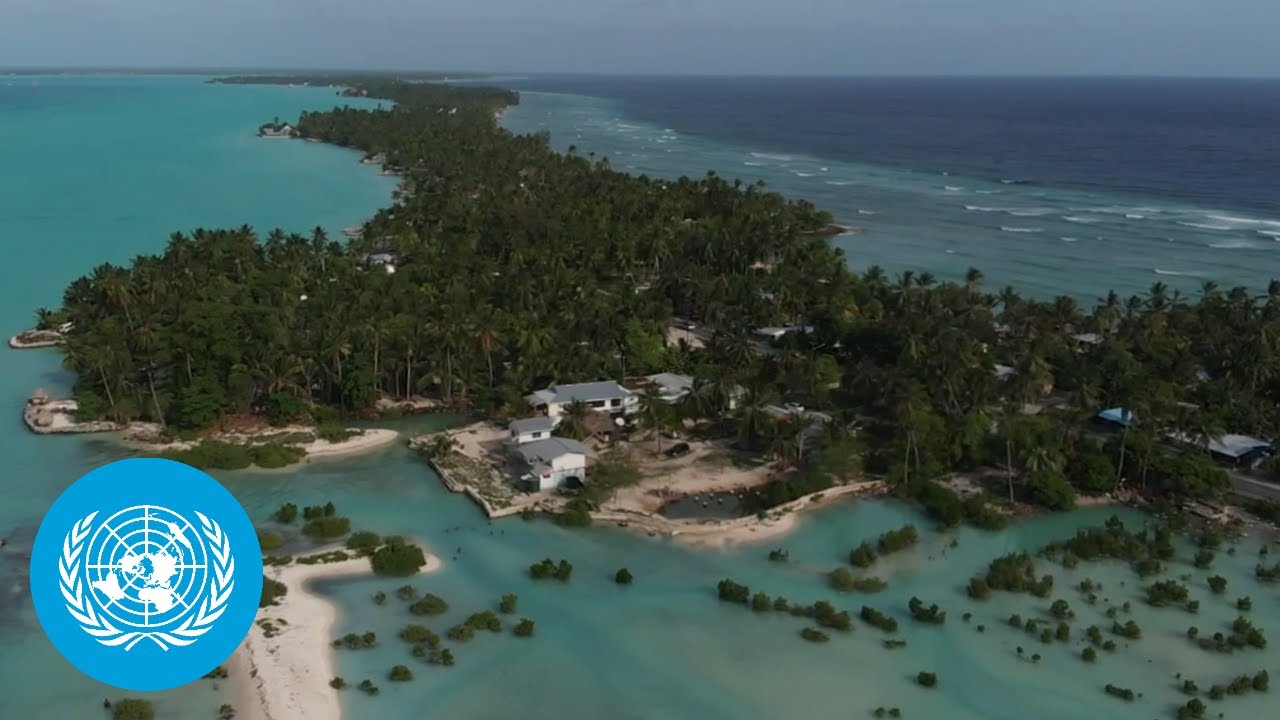Kiribati and climate change | DW Documentary
Summary
TLDRThe transcript highlights the plight of Kiribati, a South Pacific nation threatened by climate change. Rising sea levels and increased storms are eroding land and contaminating drinking water, with the entire country at risk of becoming uninhabitable. Despite the challenges, residents like Peli Alofa, a climate activist, are fighting to protect their homeland through initiatives like building walls and creating resilient farming methods. International aid is crucial for the survival of Kiribati, as its people face the harsh realities of climate change and the potential loss of their culture and way of life.
Takeaways
- 🌊 Kiribati, a South Pacific nation, is facing the threat of becoming uninhabitable due to rising sea levels caused by climate change.
- 🏝️ The country consists of 33 small islands, many of which are less than 1 meter above sea level, making them extremely vulnerable to sea level rise.
- 🌳 The increasing tide levels are causing erosion, with trees falling and land being corrupted, leading to the destruction of homes and infrastructure.
- 🌀 The frequency of storms is on the rise, exacerbating the situation and causing further damage to the islands.
- 💧 Access to fresh drinking water is becoming a significant issue as saltwater intrusion contaminates groundwater.
- 🌱 Climate activists in Kiribati are working to adapt by creating new methods for growing food in salinized soil.
- 🛕 Some residents are building walls to protect their homes from the encroaching sea, but these are only temporary solutions.
- 🗣️ There is a call for international aid, as Kiribati lacks the technology and funds to address the scale of the problem effectively.
- 🌐 The international community, including potential donors like China, is yet to provide substantial support to help Kiribati combat climate change.
- 🎶 There is a strong sense of community and solidarity among Kiribati residents, who are determined to protect their culture and way of life despite the challenges.
Q & A
What is the main threat to the South Pacific nation of Kiribati mentioned in the script?
-The main threat to Kiribati is the rising sea levels due to climate change, which could make the entire country uninhabitable.
What are the current effects of climate change on Kiribati as described in the script?
-The effects include land disappearing, an increase in the number of storms, and drinking water becoming salty. Additionally, high tides are reaching further inland, causing damage to infrastructure and the environment.
What is the significance of the 'Resilient Village' project in Kiribati?
-The 'Resilient Village' project demonstrates the community's efforts to combat the effects of climate change by building a wall to drain land and protect against flooding, showcasing the nation's resilience.
How do residents of Kiribati adapt to the salinization of soil and water?
-Residents are learning to grow food in salinized soil by using raised beds and creating their own soil mixtures, and they rely on rainwater as a primary source due to the salinization of groundwater.
What challenges does the main island of Teraa face regarding elevation?
-The challenges include the densely populated nature of the island, which would require the demolition and rebuilding of residential, government, and hospital buildings.
What is the role of international aid in addressing Kiribati's climate change issues?
-International aid is crucial for providing the necessary funds and resources to help Kiribati combat climate change, including potential large-scale projects like island elevation or the creation of replacement islands.
Why is the West concerned about China's involvement with Kiribati?
-The West is concerned about the possibility of new Chinese military bases in the Pacific due to China's close working relationship with Kiribati.
How are the residents of Kiribati dealing with the inconsistent water supply?
-Residents are collecting rainwater as the primary option for drinking due to the high cost of importing bottled water and the increasing salinity of groundwater.
What is the cultural significance of the land and sea for the people of Kiribati?
-The land and sea are integral to the culture, language, and identity of the people of Kiribati, and they are deeply concerned about the loss of their homeland due to climate change.
What is the message conveyed through the song sung by Tangarao's niece in the script?
-The song conveys a plea for help and compassion from the world, acknowledging the growing strength of climate change and its devastating impact on Kiribati.
Outlines

This section is available to paid users only. Please upgrade to access this part.
Upgrade NowMindmap

This section is available to paid users only. Please upgrade to access this part.
Upgrade NowKeywords

This section is available to paid users only. Please upgrade to access this part.
Upgrade NowHighlights

This section is available to paid users only. Please upgrade to access this part.
Upgrade NowTranscripts

This section is available to paid users only. Please upgrade to access this part.
Upgrade Now5.0 / 5 (0 votes)





